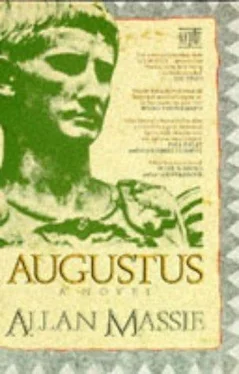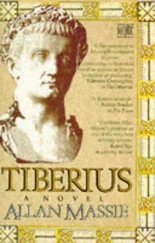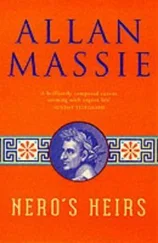Allan Massie - Augustus
Здесь есть возможность читать онлайн «Allan Massie - Augustus» весь текст электронной книги совершенно бесплатно (целиком полную версию без сокращений). В некоторых случаях можно слушать аудио, скачать через торрент в формате fb2 и присутствует краткое содержание. Жанр: Исторические приключения, на английском языке. Описание произведения, (предисловие) а так же отзывы посетителей доступны на портале библиотеки ЛибКат.
- Название:Augustus
- Автор:
- Жанр:
- Год:неизвестен
- ISBN:нет данных
- Рейтинг книги:4 / 5. Голосов: 1
-
Избранное:Добавить в избранное
- Отзывы:
-
Ваша оценка:
- 80
- 1
- 2
- 3
- 4
- 5
Augustus: краткое содержание, описание и аннотация
Предлагаем к чтению аннотацию, описание, краткое содержание или предисловие (зависит от того, что написал сам автор книги «Augustus»). Если вы не нашли необходимую информацию о книге — напишите в комментариях, мы постараемся отыскать её.
Augustus — читать онлайн бесплатно полную книгу (весь текст) целиком
Ниже представлен текст книги, разбитый по страницам. Система сохранения места последней прочитанной страницы, позволяет с удобством читать онлайн бесплатно книгу «Augustus», без необходимости каждый раз заново искать на чём Вы остановились. Поставьте закладку, и сможете в любой момент перейти на страницу, на которой закончили чтение.
Интервал:
Закладка:
'See here,' he said, 'it's simple. You all know what Antony is. I'm an ordinary man myself. I know you can't trust Antony. He'd make off with his granny's last sow. You know that fine. There's not one of you will feel safe if he wins. That's what this meeting's about. Now I know Octavian here better than any of you. You may think he's a bit on the young side. Well, just ask yourselves what sort of mess his elders have got us all in to. I tell you a pig in shit would find it stinking. What sort of future will they give you and your children? Maybe it's time they turned over and gave youth a chance. At least we don't have criminal records. We're not drunkards and we haven't murdered our benefactors. Octavian here's a good lad. All right, he's young, but he offers you all the chance of a decent future. You just think about that. If you've got any nerve at all, or anything but sawdust in your top storey, you'll back us. To the bloody hilt, if you've got your wits about you.'
Maybe it didn't quite convince them, but it saved the day. The colour crept back into Maecenas' cheeks. He had really been afraid. Being what he was, he never trusted a crowd. It was his constant fear that one false word and they'd tear us apart. I learned a lot that day. Cicero's reaction was characteristic: 'What a speech', he wrote to Atticus. 'Have I over-rated the boy's capacity, and underestimated his inheritance from Julius?' The tenth of November left me much to retrieve.
Fortunately, when you let yourself down, you often find that your enemies make mistakes which allow you time to recover.
We scurried out of the city that night, in a welter of baggage, recrimination, confusion and panic. Philippus, trembling like a man with fever, received us in his Sabine villa.
'You've blundered terribly,' he said. 'What were you thinking of? Were you mad enough to attempt a coup? You've put yourself outside the pale, outside the law. No respectable man will dare work with you now. Even Publius Servilius Isauricus, who's been your best friend among the consulars, has got cold feet.'
'He lent us Titus Cannutius,' I said. 'The tribune is his man, and it was with Publius Servilius' agreement that he led the attack on Antony.'
'Quite, absolutely, but it failed. And Publius Servilius wants no more of you. Look, here's a letter to that effect. Why, he even urges me, for my own safety, to deny you my house. What will your mother say? Why, oh why, didn't you listen to me? This is the price you are paying for disregarding my advice
I looked at his ignoble middle-aged terror, and turned to Agrippa.
'You were wise,' I said, 'in what you told the crowd. We have stumbled, no more. Stepfather, believe me, the game is not lost. But what I must know is where Balbus can be found.' 'He won't help you now either.'
'I think he will,' I said, 'and we need money. Money. If Balbus will raise me another half-million we shall come through.'
I have hardly mentioned Balbus. Perhaps I hoped, with that vanity that never absolutely deserts us, to tell you my story without reference to him. Yet, if I wish to instruct you (and tell the truth), I cannot avoid doing so.
Balbus was a phenomenon, a citizen of Gades in Spain, whom Julius had got to know in his first campaign in the country. His wealth, based on silver mines, great latifundia, and banking was enormous; it early became self-perpetuating. You will hardly understand that, my sons; indeed, despite my own banking blood, I do not know how it happens. There is, it seems, a law of the God Moneta: those who devote themselves to his service discover the secret of perpetual fertility. Beyond an indeterminate point money breeds money. Balbus early reached the stage when he could not consume the interest on his investments; before long he could not consume the interest on the interest which he laid out at interest. As long as he avoided injudicious investment, it seemed that his god had granted him a licence to coin his own money.
When I arrived at Brindisi at the end of March, I had found a note from him: 'Draw on me for whatever you need from Anaxogoras the Greek at the sign of the Fish in this city,' it said. I had my friend Publius Salvidienus Rufus take the note thither for verification of the seal. Then, by night, accompanied by Rufus and Agrippa, cloaked and hooded, we slipped through the darkened town on slimy cobbles to the Greek's house. He had received his own instructions. It was then I first sensed what no born gentleman realizes: the occult expedition of money. There were chests waiting for us, loaded with gold pieces. Where they had come from, I do not know. It is a religious mystery. All I had to do was sign for the gold. I dispatched Agrippa to fetch Maco and his legionaries with carts. It was that gold which financed my first march on Rome.
Now, in extremity, I said to Philippus: 'I am for Aretrium in Etruria. If Balbus will produce another half-million, we shall come through. Don't be afraid.'
I named the sum at random. I had no idea what we would need.
Balbus later said to me, 'I backed you the way I corner wheat when my agents get the first rumours of a bad harvest.'
That is how money works, like all mysteries, through its initiates.
But not only Balbus saved me in this crisis, producing magic credit which enabled Agrippa to raise more troops, enabled me also to send out scores of agents into Antony's camp; Antony himself misplayed his hand.
He was in Rome a fortnight after I left the city. He left most of his troops at Tibur, but his bodyguard was still strong enough to overawe and frighten the disaffected. His temper was high, he arrived in liquor and stayed half-drunk for four days. He called a meeting of the Senate for the twenty-fourth, but failed to attend himself. Cicero (and others) let it be known that the consul was too drunk to be seen in public. As if that ever stopped Antony! I had better reason to know what prevented him. On the same day as he entered Rome my agents distributed leaflets among the men of the Martian legion; not only leaflets, as you may imagine. Maco himself had approached their camp and sought out old comrades among Antony's centurions. He dealt out gold and golden promises. Would they fight against Caesar's son? he asked those veterans of the Gallic War. Could they live with themselves if they destroyed their master's heir? He touched their hearts; he fed their appetites. The Martian legion declared for me and shut themselves up in Alba Fucens. With one stroke, while Antony dined in Rome, I had retrieved what seemed lost less than two weeks before.
My position was still dangerous. All that year I diced with death and dishonour – which was worse. (Remember, my sons, that your actions must always be such as will permit you to live with self-approbation.) Antony let everyone know – he shouted it to the rooftops – that I had been guilty of what he chose to call illegality. I was innocent, for legality was nowhere to be found that year. Legality rests on the point of the sword; when swords are raised against each other, legality floats into the heavens to await the decision of the Gods. If no one can enforce the laws, all strong men assume the right to do so. It is inevitable. Antony however played high; I admired him for that. On the twenty-eighth the Senate at last met. His creature, Q. Rufius Calenus, was ready to bring in a bill denouncing me as a public enemy. Caesar himself had been so denounced – and had scattered his accusers before him. Conscious of the rediscovered loyalty of the Martian legion, of the success Agrippa was meeting in recruitment, I could afford to regard the threat with equanimity.
Then Antony's nerve failed him. He dared not press the charge against me. That was prudent, for my agents were doing their work among his legions. They played on their natural reluctance to take up arms against me. Caesar, Caesar, Caesar… the magic word ran round the camp till Antony pressed his fingers in his ears against it. Yet he too was caught; he too aspired to share Caesar's legacy; he himself depended on my father's glory. We were linked in a dance to a ghostly tune.
Читать дальшеИнтервал:
Закладка:
Похожие книги на «Augustus»
Представляем Вашему вниманию похожие книги на «Augustus» списком для выбора. Мы отобрали схожую по названию и смыслу литературу в надежде предоставить читателям больше вариантов отыскать новые, интересные, ещё непрочитанные произведения.
Обсуждение, отзывы о книге «Augustus» и просто собственные мнения читателей. Оставьте ваши комментарии, напишите, что Вы думаете о произведении, его смысле или главных героях. Укажите что конкретно понравилось, а что нет, и почему Вы так считаете.












